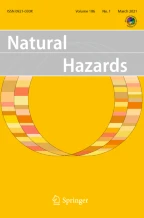Abstract
Drought has become a recurrent phenomenon in Turkey in the last few decades. Significant drought conditions were observed during years of late 1980s and the trend continued in the late 1990s. The country’s agricultural sector and water resources have been under severe constraints from the recurrent droughts. In this study, spatial and temporal dimensions of meteorological droughts in Turkey have been investigated from vulnerability concept. The Standardized Precipitation Index (SPI) method was used to detail geographical variations in the drought vulnerability based on frequency and severity of drought events at multiple time steps. Critical (threshold) rainfall values were derived for each station at multiple-time steps in varying drought categories to determine least amount of rainfall required to avoid from drought initiation. The study found that drought vulnerability portrays a very diverse but consistent picture with varying time steps. At regional scale, south-eastern and eastern Anatolia are characterized with moderate droughts at shorter time steps, while the occurrence of severe droughts at shorter time steps is observed at non-coastal parts of the country. A similar picture was observed with very severe droughts. The critical (threshold) values exhibited rising numbers during the growing season at 3-month step in the South-eastern Anatolia, which might have significant consequences considering presence of large irrigation projects under-development in the region. In general, rainfall amounts required for non-drought conditions decrease from the coastal parts toward the interiors with increasing time steps.
Similar content being viewed by others
References
M. Abramowitz A. Stegun (Eds) (1965) Handbook of Mathematical Formulas, Graphs, and Mathematical Tables Dover Publications New York
American Meteorological Society: 2003, Meteorological drought, Bull. Am. Met. Soc.85, USA.
H. M. Cullen P. B. deMonecal (1999) ArticleTitleNorth Atlantic influence on Tigris-Euphrates streamflow Int. J. Climatol. 20 853–863
J. A. Dracup K. S. Lee E. G. Paulson SuffixJr. (1980) ArticleTitleOn the definition of droughts Water Resources Res. 16 297–302
Downing, T. E. and Bakker, K.: 2000, Drought discourse and vulnerability, In: D. A. Wilhite (ed), Drought: A Global Assessment,Natural Hazards and Disasters Series, Routledge Publishers, UK.
Edwards, D. C. and McKee, T. B.: 1997, Characteristics of 20th century drought in the United States at multiple timescales, Colorado State University: Fort Collins. Climatology Report No. 97–2.
N. B. Guttman (1998) ArticleTitleComparing the Palmer drought index and the standardized precipitation index J. Am. Water Resour. Assoc. 34 113–121
N. B. Guttman (1999) ArticleTitleAccepting the standardized precipitation index: A calculation algorithm J. Am. Water Resources Assoc. 35 311–322
M. J. Hayes M. D. Svoboda D. A. Wilhite O. V. Vanyarkho (1999) ArticleTitleMonitoring the 1999 drought using the standardized precipitation index Bull. Am. Meteorol. Soc. 80 429–438
J. W. Hurrell (1995) ArticleTitleDecadal trends in the North Atlantic oscillation: Regional temperatures and precipitation Science 269 676–679
S. P. Keenan R. S. Krannich (1997) ArticleTitleThe social context of perceived drought vulnerability Rural Sociol. 62 69–88
A. U. Komuscu (2002) ArticleTitleAn analysis of recent drought conditions in Turkey in relation to circulation Patterns Drought Network News 13 5–6
Komuscu, A. U.: 2003, Weather Modification Activites in Turkey. Proceedings of Eight WMO Scientific Conference on Weather Modification.,casablanca, Morocco. WMO Report No. 39, Geneve, Switzerland, pp. 39–42
A. U. Komuscu A. Erkan S. Oz (1998) ArticleTitlePossible impacts of climate change on soil moisture variability in the Southeast Anatolian development project (GAP) region; An analysis from agricultural drought perspective Clim. Change 40 519–545
B. Lloyd-Hughes M. Saunders (2002) ArticleTitleA drought climatology for Europe Int. J. Climatol. 22 1571–1592
McKee, T. B., Doesken, N. J., and Kleist, J.: 1993, The relationship of drought frequency and duration to time steps, Preprints, 8th Conference on Applied Climatology, January 17–22 Anaheim, California, pp. 179–184.
Namias, J.: 1985, Hydrologic aspects of drought, In: Beran, M. A. and Rodier, J. A., (eds), Unesco-World Meteorological Organization, A Contribution to the International Hydrologic Programme, Paris, France, 27–64.
E. O. Oladipio (1985) ArticleTitleA comparative performance analysis of three meteorological drought indices Int. J. Climatol. 5 655–664
InstitutionalAuthorNameSurfer (1997) Surfer Mapping System, Ver. 2 6.04 Golden Software Golden, CO, USA
H. C. S. Thom (1958) ArticleTitleA note on the gamma distribution Monthly Weather Rev. 86 117–122
O. V. Wilhelmi D. A. Wilhite (2002) ArticleTitleAssessing vulnerability to agricultural drought: A Nebraska case study Natural Hazards 25 37–58
D. A. Wilhite M. H. Glantz (1985) Understanding the drought phenomenon: The role of Definitions, Water International 10 111–120
D. A. Wilhite (1993) The enigma of drought, Chapter 1 D. A. Wilhite (Eds) Drought Assessment, Management, and Planning: Theory and Case Studies Kluwer Academic Publishers Boston 3–17
D. A. Wilhite (2000) Drought as a natural hazard: Concepts and definitions, Chapter 1 D. A. Wilhite (Eds) Drought: A Global Assessment, Natural Hazards and Disasters Series Routledge Publishers UK
Author information
Authors and Affiliations
Corresponding author
Rights and permissions
About this article
Cite this article
SÖNMEZ, F.K., KÖMÜSCÜ, A.Ü., ERKAN, A. et al. An Analysis of Spatial and Temporal Dimension of Drought Vulnerability in Turkey Using the Standardized Precipitation Index. Nat Hazards 35, 243–264 (2005). https://doi.org/10.1007/s11069-004-5704-7
Received:
Accepted:
Issue Date:
DOI: https://doi.org/10.1007/s11069-004-5704-7
